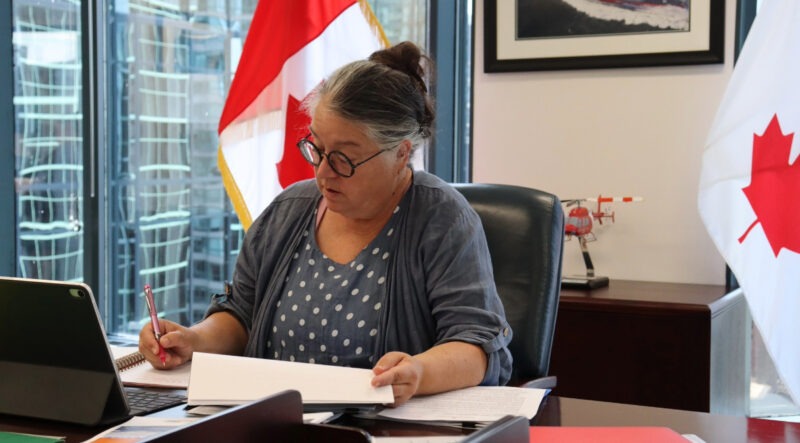Why anti-salmon farming activists fear Canada’s new Fisheries Minister
“These activists are getting desperate…They want a minister, like the previous two, who will listen to their unfounded claims and ignore the peer-reviewed science about salmon farming.”
By Fabian Dawson
SeaWestNews
Anti-salmon farming activists are urging Prime Minister Justin Trudeau to keep an eye on his new Fisheries Minister, Diane Lebouthillier, fearing that she may opt to let science instead of their fearmongering dictate the future of marine aquaculture in British Columbia.
The activists, who met with Lebouthillier this week to peddle their science-deficit assertions in the nation’s capital, are also signalling that they will hurt the Liberals at the ballot box if their demands to shut down open-net salmon farming are not met.
The group led by Chief Bob Chamberlin, chair of the First Nation Wild Salmon Alliance, claims that the salmon farms in BC threaten wild migrating stocks, despite a plethora of scientific studies and court rulings that state otherwise.
“I urge the Prime Minister to look in on the new DFO Minister Diane Lebouthillier,” Chamberlin told a press conference in Parliament, falsely claiming that the government had pledged to close salmon farms off the B.C. coast by 2025.
There is no such mandate to remove salmon farms from the ocean, as the government works on a transition plan for the industry on Canada’s west coast.
The most current language regarding the BC salmon farming Transition Plan states; “The proposed vision of this open-net pen transition plan is to advance innovation and growth of sustainable aquaculture in British Columbia that progressively minimizes or eliminates interactions between open-net pens and wild salmon, while also taking into account social, cultural and economic objectives.”
Chamberlin said that come the next election, expected in 2025, salmon farms will be an issue in many B.C. ridings if there is not progress on closing them before then, according to a report in the Globe and Mail.
“If there is a backtracking, if there is going to be no further safeguards for wild salmon, of course this will take on a great focus of First Nations,” he said.
Unlike her predecessors, Lebouthillier is placing a lot more emphasis on the federal government science which states salmon farms do not pose more than minimal risk to wild Pacific salmon, said sources in Ottawa.
This goes against the activists’ central mantra that any government science or traditional knowledge challenging their claims should not be believed as it is influenced by salmon farmers.
The activists have also made recent fake claims attempting to link this year’s high returns of adult pink salmon to the closure of some salmon farms – all of which have been thoroughly debunked, based on data collated by professional biologists and the Department of Fisheries and Oceans (DFO).
“These activists are getting desperate…They want a minister, like the previous two, who will listen to their unfounded claims and ignore the peer-reviewed science about salmon farming,” said an industry official.
The salmon farming sector in British Columbia is a vital part of the local economy and Canada’s Blue Economy, providing $1.2 billion in annual economic activity and supporting over 5,000 jobs in coastal indigenous and non-indigenous communities.
First Nation leaders who support salmon farming and members of the BC Salmon Farmers Association have also met Minister Lebouthillier to discuss the Federal Government’s plan to transition open-net aquaculture operations on Canada’s West Coast.
The Coalition of First Nations for Finfish Stewardship (FNFFS) in a statement said it was disappointed to see representatives from the BC First Nations Wild Salmon Alliance once again pitting First Nations against First Nations in Ottawa.
The Coalition said the activists are spouting “misinformation about salmon farming in our territories and attempting to erase the sovereign rights and title of over a dozen coastal Nations in B.C. to suit an activist-driven agenda based on activist science.”
“This is not a numbers game for us. We are coastal, often remote communities that are fighting for the revival of wild salmon, our economic self-determination, and the human well-being of our people. As coastal First Nations, we have always prioritized the ecological health of our lands, waters and elements and continue to do so, while working towards a sustainable future for our communities,” the Coalition said in a statement.
Brian Kingzett, executive director of the BC. Salmon Farmers Association (BCSFA) said the activists are attempting to influence the transition process led by the Fisheries Minister.
“All farms operating in BC are currently done in agreement, negotiation, or established partnerships with First Nations in whose territories we operate. First Nations’ right to self-determination and reconciliation will lead to a successful transition plan, as outlined in our Transition Principles,” he said.
The activists’ media blitz in Ottawa this week comes as the latest edition of the Coller FAIRR Protein Producer Index that ranks companies in responsible food production, found salmon farmers produce the most sustainable animal protein in the world.
“Canadian salmon farming companies are dedicated to a healthy planet and a healthy future for all people,” said Timothy Kennedy, President & CEO, Canadian Aquaculture Industry Alliance. “We are proud to see this reflected in the global ranking of salmon producers among the most sustainable protein producers on earth,” he said.
(File image of Fisheries Minister, Diane Lebouthillier)

